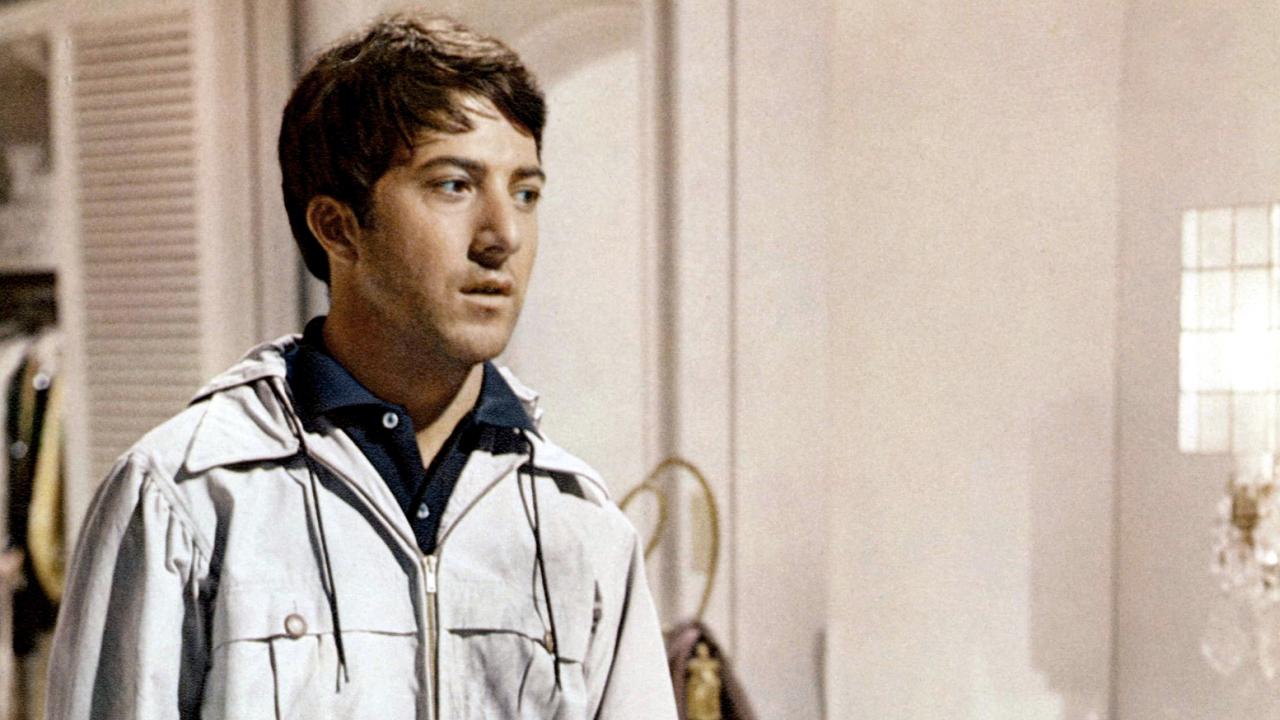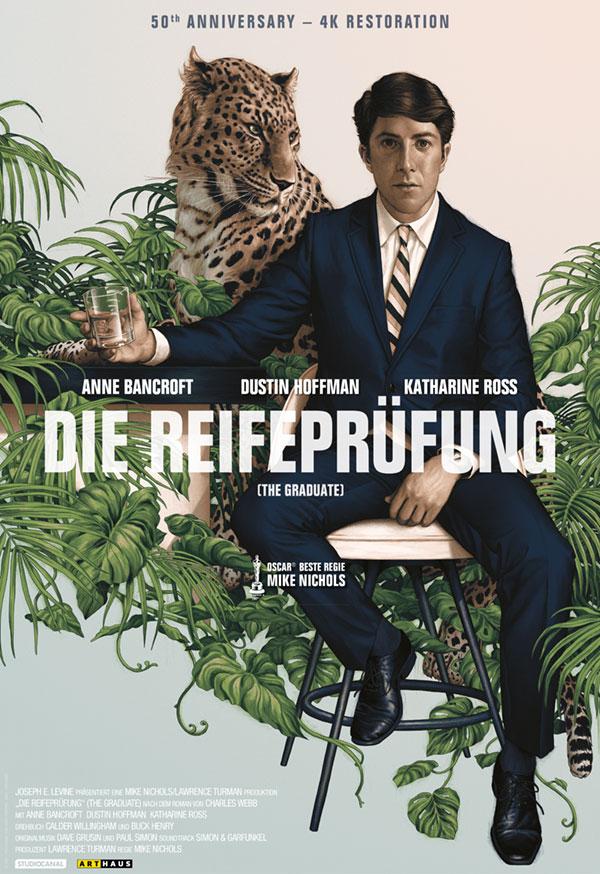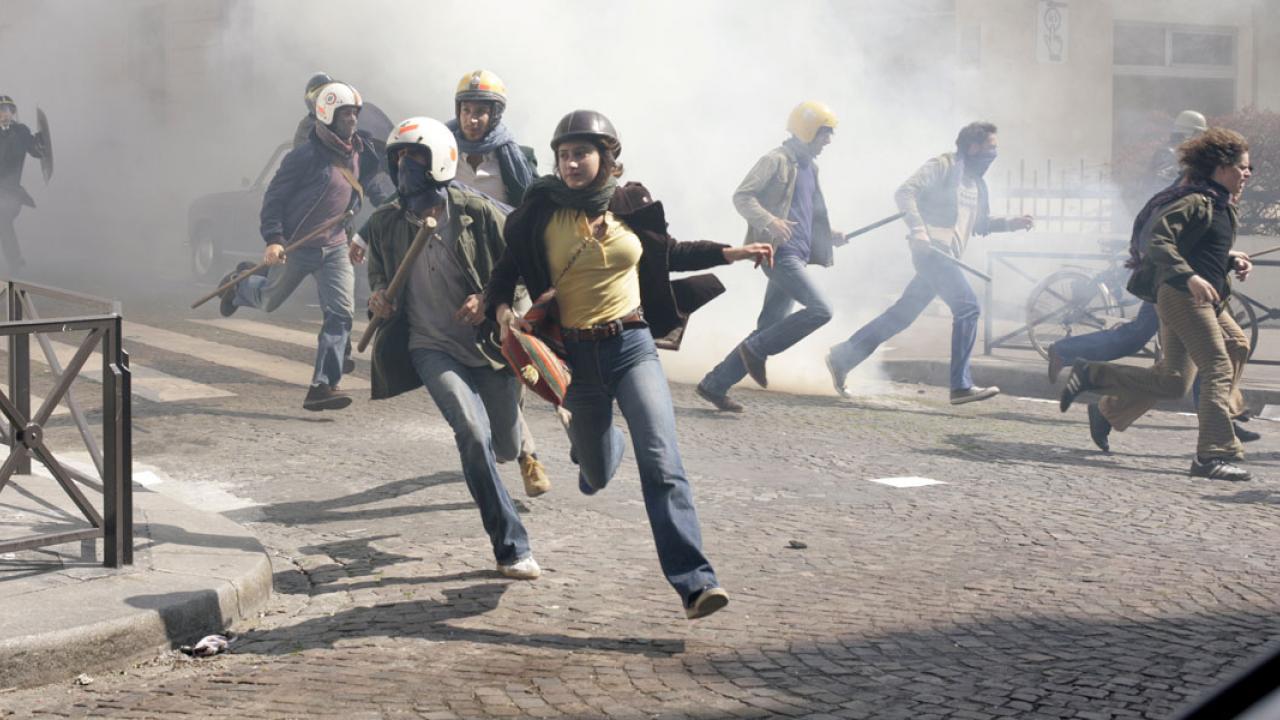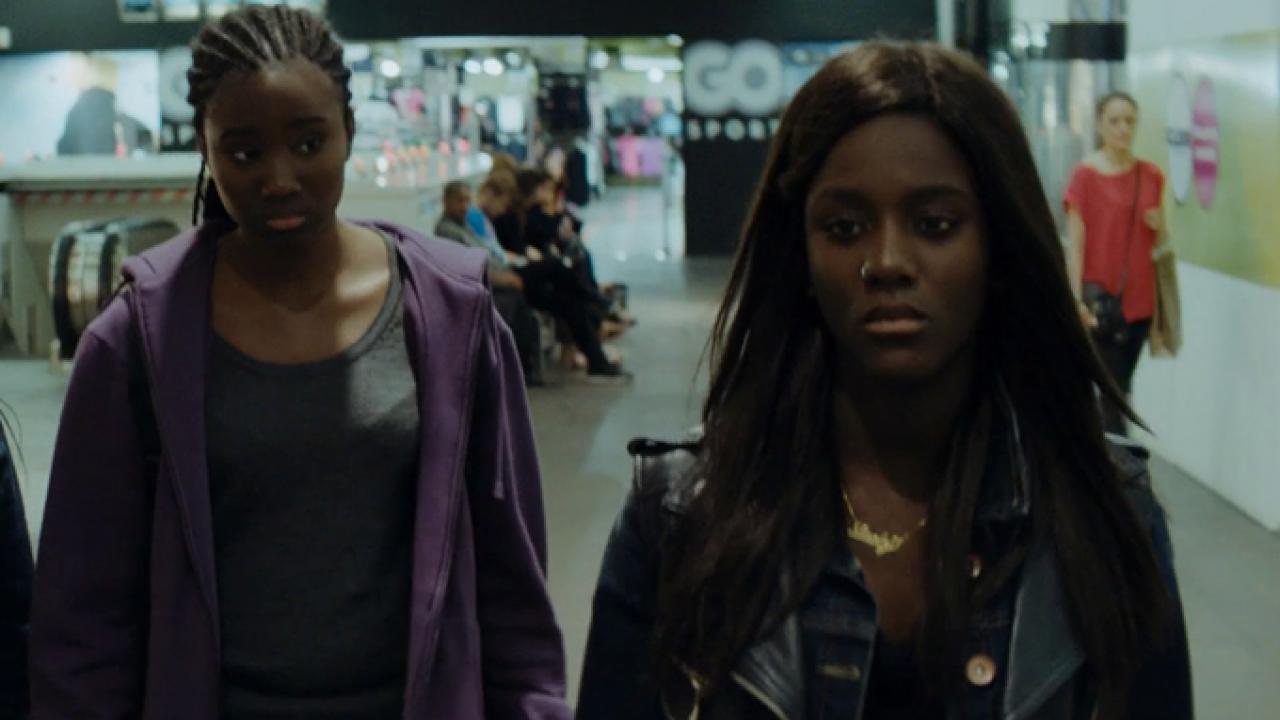Kategorie: Filmbesprechung auf englisch
"The Graduate"
A successfull college graduate in his early twenties, Benjamin returns to his parents' home in the summer. He can choose to do whatever he wants, but is plagued by anxiety about his future.

Unterrichtsfächer
Thema
It is Benjamin's 21st birthday and he is supposed to show off his parents' gift, an expensive diving suit, in the family's pool. He shuffles robotically to the water's edge. The camera adopts his point of view (Glossar:Zum Inhalt: Kameraperspektiven) through the oval diving mask and the lively commentaries of his parents and their guests go silent. Benjamin dives in and remains motionless at the bottom of the pool, sealed off from the outside world by a double barrier of water and neoprene. The camera pulls back (Glossar: Zum Inhalt: Kamerabewegungen). Peace at last.
This iconic scene (Glossar: Zum Inhalt: Szene) from Mike Nichols' "The Graduate" encapsulates this Zum Inhalt: coming-of-age film. The good son of a good family lives his life as expected by his straight-laced parents; before he can rebel, he must overcome this heteronomy and behave accordingly. The adaptation (Glossar: Zum Inhalt: Adaption) of Charles Webb's novel, published in 1963, made Dustin Hoffman world-famous, won Nichols an Oscar for Best Director and marked the beginning of a new, wilder Hollywood.
"I want my future to be … different"
Benjamin Braddock has graduated from college with flying colours. He can choose to do whatever he wants but instead of taking control of his life, he is plagued by anxiety about his future. He has always done what his parents wanted, but now he is gradually realising that he wants to live a "different" life. The problem is, what should that life look like? As he searches for meaning in his life, in crashes Mrs. Robinson, the wife of his father's business partner. Twice his age, she seduces her friends' son into an affair that lasts the whole summer. Until Benjamin falls in love with Elaine, his lover's daughter.
The film's attraction lies not so much in its simple plot as in the striking portraits it draws of its characters. Mike Nichols and the screenplay (Glossar: Zum Inhalt: Drehbuch) writers Calder Willingham and Buck Henry have created very nuanced, credible figures. Hoffman expresses the drastic transformation of a clumsy youth with many subtle gestures. Anne Bancroft plays the seductive Mrs. Robinson with an appealing mixture of objectivity, cool eroticism and sneering irony. In comparison with Benjamin and Mrs. Robinson, Elaine, played by Katharine Ross, is somewhat bland. In her role as a "good girl", she adapts to the norms, starts a relationship with the smooth careerist Carl and, at her mother's insistence, even agrees to marry him.
Coming-of-Age in a Time of Upheaval
In classic Bildungsroman style (e.g. like Goethe's Wilhelm Meister's Apprenticeship) "The Graduate" focusses on the development of the young main figure's character, becoming a much-quoted reference for subsequent coming-of-age films. The Zum Inhalt: exposition introduces Benjamin as a care-free youth; in the closing scene, he has become a man of action, ending this maturing process with a big bang.
Along the way, his materialist parents represent the exact opposite of their son's lack of orientation. Honest communication seems almost impossible with them: stuttering conversation is kept going with questions, which either go unanswered altogether or whose answers go unnoticed. Gradually, the grown-ups disappear in the backlight (Glossar: Zum Inhalt: Licht und Lichtgestaltung) or go out of focus (Glossar: Zum Inhalt: Tiefenschärfe/Schärfentiefe). Nichols paints a picture of American society in the mid-1960s as one of upheaval, marked by the Vietnam War, youthful rebellion and sexual revolution. He does not spare the Californian upper class and juxtaposes it with counter-cultural ideas.
A New Sound for a New Hollywood
"The Graduate" was made as Hollywood's studio system went through a decade-long crisis. Along with Arthur Penn's gangster film "Bonnie and Clyde" (USA 1967), Nichols' film marked the beginning of the era of Zum Inhalt: New Hollywood. Following in the footsteps of France's Nouvelle Vague, mainly young directors – mostly male, as female directors were still a rarity in Hollywood – now modernised the language of US films, too. One stylistic innovation, for example, was Nichols' use of pop music. The soundtrack (Glossar: Zum Inhalt: Filmmusik), by folk-rock duo Simon & Garfunkel, was instrumental in how quickly the movie attained cult status. The lyrics of the song The Sound of Silence, published already in 1964, gave precise expression to Benjamin's isolation: "Hello darkness, my old friend" goes one of the first lines; later on Simon sings: "People talking without speaking, people hearing without listening".
At the beginning of one of the sequences (Glossar: Zum Inhalt: Sequenz), in which time is elapsing in smooth transitions, Nichols overlays "Hello darkness" onto a black background, creating a symbiosis between image and music. The song title (The Sound of Silence) is also reflected in many silent or unspoken scenes. Nichols uses the second big hit from the soundtrack, the specially-composed, chart-topping Mrs. Robinson, in a similar fashion: the conciliatory ode to an unfaithful wife and jealous mother ("And here’s to you, Mrs. Robinson!") accelerates the already rapid narrative speed as it reaches its climax; the driving guitar riff comes to an end just as Benjamin's convertible runs out of petrol.
Content and Composition of Images
The film's image composition (Glossar: Zum Inhalt: Bildkomposition), which was unusual for its time, is ideal for character portrayal. Repeatedly, point-of-view shots indicate that the story is being told from Benjamin's perspective. His lack of orientation is reflected in the elegant leitmotif of the Zum Inhalt: mise-en-scène: many scenes begin not with the standard Zum Inhalt: establishing shot, but with a close-up (Glossar: Zum Inhalt: Einstellungsgrößen) of Benjamin's face. This serves to confuse right from the opening shot: Benjamin's head rests on a white background. But where is he? It is not until the camera Zum Inhalt: zooms back that we realise he is on an airplane.
At first viewing, "The Graduate" has a happy ending. However, Mike Nichols makes no attempt to conceal the fact that Benjamin's new, hard-fought self-determination is no panacea for a happy life, rather the basis for one. Many of the unanswered questions from the start of the film are still unresolved for the young man. The future remains uncertain.




